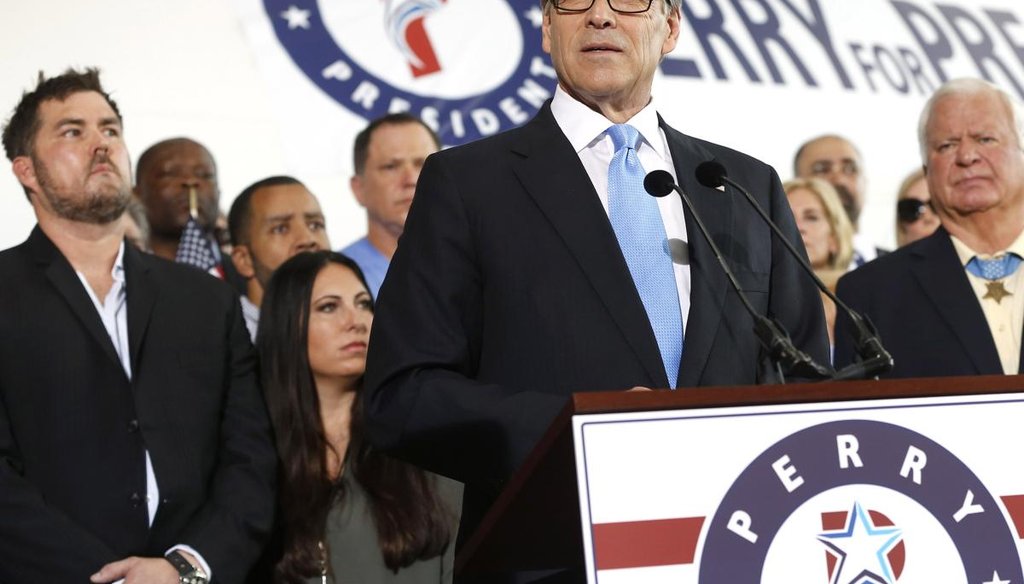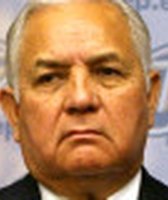Get PolitiFact in your inbox.

Former Texas Gov. Rick Perry, shown here announcing his second bid for president in June 2015, rallied Texas delegates to the Republican National Convention July 18, 2016 (Getty Images).
Former Texas Gov. Rick Perry rallied fellow home-state delegates to the Republican National Convention in Cleveland Monday morning partly by revisiting claims about Texas job growth and high school graduation rates that we’ve explored before.
As governor, Perry often ballyhooed upticks in Texas jobs. We found merit to most of his jobs claims though we noted too that governors (like presidents) don’t control economic conditions.
As governor from late 2000 through 2014, Perry also talked up how well Texas ranks nationally in high school graduation rates though in 2015 he mismatched figures--as he did again in Cleveland while urging delegates, festooned in the colors of the state flag, to back Donald Trump for president.
At the state delegation’s so-called breakfast gathering--no food was served, far as we could tell--Perry said that thanks to pro-growth regulatory, tax and tort reform policies put in place on his watch, "there was one point in time when Texas created more jobs than the rest of the nation combined." Perry then added, to laughter: "I never did get the call from President Obama to thank me for that one. He’s always talking about... how well the economy is doing. I was kind of like, ‘yeah, Texas.’" ( In 2010, incidentally, we found Pants on Fire a Perry claim that he’d never fielded a phone call from the Obama White House; his schedule showed just such a call a few weeks before.)
In September 2010, we rated True Perry’s claim that "we’ve created more than 850,000 jobs, more than all the other states combined." Bureau of Labor Statistics figures showed a net gain of 853,400 Texas jobs since January 2001 with the rest of the nation seeing net losses of 3.1 million jobs.
In January 2015, more recently, we found Mostly True Perry’s statement that starting in December 2007, "1.4 million jobs were created in Texas. In that same period, the rest of the country lost 400,000 jobs." By a bureau metric called total civilian employment, which counts self-employed individuals, "Texas by far leads all states, with total civilian employment growth of 1,410,440; California is a distant second," bureau economist Cheryl Abbot told us at the time. We noted, though, that the country apart from Texas was down more like 350,000 workers.
For that fact-check, analyst David Cooper of the liberal Economic Policy Institute commented that the timeframe singled out by Perry may have delivered a more glowing contrast for Texas than other periods. According to the government’s separate payroll surveys, he said, the country had added 9.1 million jobs since June 2009, the acknowledged end of the national recession, with Texas accounting for 1.5 million of the additions. Significantly, Cooper said, the rest of the country as a whole lost jobs from June 2009 until February 2010. Since then, he said, the U.S. had added more than 10 million jobs with Texas (again) accounting for more than 1 million of them.
Mark J. Perry, a scholar at the American Enterprise Institute and professor of economics and finance at the University of Michigan campus in Flint, said that in his view, the best comparison of Texas to the rest of the nation would start in December 2007. His point: "Texas never experienced significant job losses during the Great Recession, while the rest of the country did."
In Cleveland, Perry said Texas greatly improved its high school graduation rates on his watch. "In 2003, Texas was 27th in the nation in high school graduation rates," Perry said. "And that’s about in the middle of the pack. And some people said you know, that’s pretty good."
But Texas lawmakers emphasized teacher incentive pay, charter schools and student scores on state-mandated exams to propel improvement, Perry said. "And a decade later, Texas had the second-highest high school graduation rates in America," he said, going on: "If you were Hispanic or African American, you were living in the state that had the highest high school graduation rates in America. You want to send a message? You want to send a message to the minority community in this country that we care about you, we love you, we want your children to have a better future than you do, you graduate them from high school."
In June 2015, we found Mostly True Perry’s claim that "Texas now has the second-highest high school graduation rate in the country. And it has the highest graduation rate for African Americans and Hispanics." Almost: In 2012-13, per federal statistics, Texas ranked No. 3 in overall graduation rates and No. 1 for its African American and Hispanic rates. Then again, comparing graduates to the number of ninth graders enrolled three years earlier, Texas in 2011-12 had an 82 percent "averaged freshman graduation rate," tying with four states and trailing 21 states.
A month later, we saw flaws in the graduation rate claim Perry echoed in Cleveland: "Texas’ high school graduation rate went from 27th in the country in 2002, to second highest in the country in 2013."
Texas graduation rates had improved, we found, but not nearly as much as Perry suggested. That is, the state moved from about 27th nationally in 2002 to tied for 22nd in 2012, according to a measure that compares graduates each year to tallies of students earlier enrolled in lower grades. By a newer gauge tied to tracking individual students, Texas in 2013 tied for third (not No. 2). We rated his claim Mostly False--noting that he’d evidently taken one way of counting graduates and compared it to results using a different method, a statistical no-no leaving the misimpression that Texas galloped past many states on his watch.
In his exhortation to delegates, Perry make a couple new statements that neatly hold up:
--He reminded everyone that 2003, the year of his second full legislative session as governor, "was the first time since Reconstruction that the Texas government was run by Republicans." Point well taken; that was the year Republicans held the majority of Texas House seats for the first time along with their established majority in the Texas Senate and, in Perry, the governor’s office.
--Acknowledging Donald Trump wasn’t his first choice for president--that would have been Perry himself--Perry went on: "Come on, the Aggies can’t win a national championship every year." Pause. "Oh wait, it’s been since 1940, right, Roger?" Perry was faux-seeking confirmation from U.S. Rep. Roger Williams, R-Austin, who introduced Perry at the delegation gathering. Texas A&M University, the ex-governor’s alma mater, capped its 1939 season by beating Tulane 14-13 in the Jan. 1, 1940, Sugar Bowl.
Our thanks to the Texas Tribune, which livestreamed the delegation’s morning meeting on its Facebook page. This is a good spot too to encourage your free subscription to our feed of Twitter posts by Texas delegates here.
Now, did you hear anyone say something we should fact-check?
Our Sources
Truth-O-Meter articles, PolitiFact Texas, "Gov. Rick Perry says Texas has created more than 850,000 jobs, more than the other states combined," Sept. 10, 2010; "Rick Perry says Texas gained a million jobs while rest of country lost 400,000," Jan. 22, 2015; "Rick Perry says Texas has second-best high school graduation rate, No. 1 rate for minorities," June 19, 2015; "Rick Perry says Texas shot to No. 2 from No. 27 in high-school graduation rates in about a decade," July 20, 2015







































